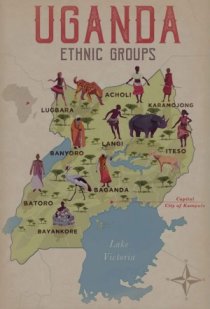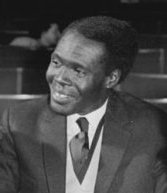 In 1886 a treaty was signed between the two European powers giving Germany claim to the coast of present-day Tanzania with Britain retaining access to the area in which Kenya and Uganda lie, with its exploration and development handed to the Imperial British East Africa Company. The company was unable to retain order in the area and virtually bankrupted itself in trying to do so, so in 1893 ransferred its administration rights of the territory to the British Government. The territory was then divided to form the Uganda Protectorate in 1894 and East Africa Protectorate (later Kenya) in 1895. This arrangement continued until Uganda was granted independence from the UK in 1962 with Milton Obote becoming executive Prime Minister with the Kabaka of Buganda, Mutesa, becoming ceremonial president. Within a few years Obote became implicated together with the deputy commander of the armed forces, one Idi Amin, in a plot to smuggle gold, coffee and ivory out of the Democratic Republic of Congo. Refusing to bow to any investigation, Obote acted swiftly to secure his power. He suspended the constitution, declared himself president and ordered a state of emergency with many former cabinet members being arrested and detained. In 1886 a treaty was signed between the two European powers giving Germany claim to the coast of present-day Tanzania with Britain retaining access to the area in which Kenya and Uganda lie, with its exploration and development handed to the Imperial British East Africa Company. The company was unable to retain order in the area and virtually bankrupted itself in trying to do so, so in 1893 ransferred its administration rights of the territory to the British Government. The territory was then divided to form the Uganda Protectorate in 1894 and East Africa Protectorate (later Kenya) in 1895. This arrangement continued until Uganda was granted independence from the UK in 1962 with Milton Obote becoming executive Prime Minister with the Kabaka of Buganda, Mutesa, becoming ceremonial president. Within a few years Obote became implicated together with the deputy commander of the armed forces, one Idi Amin, in a plot to smuggle gold, coffee and ivory out of the Democratic Republic of Congo. Refusing to bow to any investigation, Obote acted swiftly to secure his power. He suspended the constitution, declared himself president and ordered a state of emergency with many former cabinet members being arrested and detained.
 Obote (right) then had his newly appointed Chief of Staff, Idi Amin, storm the president's palace sending Kabaka Mutesa into exile and he passed a new constitution ending Buganda's autonomy and the creation of an all powerful president, himself. Obete's rule became increasingly hated as he became mired in corruption. In 1971, when he was on an overseas visit to a Commonwealth meeting in Singapore, the army moved, installing Idi Amin as President, ushering in a brutal regime that by contrast made the dictatorship of Obote seem like a golden age of peace and tranquillity. Obote (right) then had his newly appointed Chief of Staff, Idi Amin, storm the president's palace sending Kabaka Mutesa into exile and he passed a new constitution ending Buganda's autonomy and the creation of an all powerful president, himself. Obete's rule became increasingly hated as he became mired in corruption. In 1971, when he was on an overseas visit to a Commonwealth meeting in Singapore, the army moved, installing Idi Amin as President, ushering in a brutal regime that by contrast made the dictatorship of Obote seem like a golden age of peace and tranquillity.
 Amin ruled for eight years, during which time up to 500,000 Ugandans were massacred earning him the nickname the "Butcher of Uganda." Amin exacted his revenge by being earlier sidelined by Obote as the then President had become increasingly concerned at Amin's gathering of power, by sending out killer squads to track down and kill the former president's supporters. For many years the full horror of Amin's horrific rule in Uganda went mainly unnoticed by the west and it wasn't until around 1978 that his bizarre and paranoid behaviours began to appear in the international press. Amin sealed his fate in the late seventies, when against a backdrop of an economy in freefall with inflation heading towards 1000%, he attempted to annex Kagera, a northern province of Tanzania. Amin ruled for eight years, during which time up to 500,000 Ugandans were massacred earning him the nickname the "Butcher of Uganda." Amin exacted his revenge by being earlier sidelined by Obote as the then President had become increasingly concerned at Amin's gathering of power, by sending out killer squads to track down and kill the former president's supporters. For many years the full horror of Amin's horrific rule in Uganda went mainly unnoticed by the west and it wasn't until around 1978 that his bizarre and paranoid behaviours began to appear in the international press. Amin sealed his fate in the late seventies, when against a backdrop of an economy in freefall with inflation heading towards 1000%, he attempted to annex Kagera, a northern province of Tanzania.
Tanzania responded with force and, together with Ugandan rebels, toppled the Amin regime forcing him to flee the country firstly to Libya then Saudi Arabia where he died in 2003. There followed a history in Uganda of coups and counter coups during which former president Obete was restored to power and then lost it again. Following a further coup in 1986 when the National Resistance Army took the capital Kampala, Yoweri Museveni was installed as president, a post he retains to this day. Since that time there have been numerous difficulties however his rule has brought some political and economic stability despite bordering on known conflict zones such as the Democratic Republic of Congo and the Sudan. The video (left) explores more about the history of Uganda. |

 By the mid-19th century, Uganda was home to several distinct languages and cultures. However while this structure worked in the Nilotic and Sudanic speaking north, as the Bantu moved southwards the population of Uganda was organized into states or kingdoms. Before colonization, present-day Uganda had evolved into a number of distinct kingdoms and societies, each with its own unique customs, governance, and cultural heritage.
By the mid-19th century, Uganda was home to several distinct languages and cultures. However while this structure worked in the Nilotic and Sudanic speaking north, as the Bantu moved southwards the population of Uganda was organized into states or kingdoms. Before colonization, present-day Uganda had evolved into a number of distinct kingdoms and societies, each with its own unique customs, governance, and cultural heritage.



 In 1886 a treaty was signed between the two European powers giving Germany claim to the coast of present-day Tanzania with Britain retaining access to the area in which Kenya and Uganda lie, with its exploration and development handed to the Imperial British East Africa Company. The company was unable to retain order in the area and virtually bankrupted itself in trying to do so, so in 1893 ransferred its administration rights of the territory to the British Government. The territory was then divided to form the Uganda Protectorate in 1894 and East Africa Protectorate (later Kenya) in 1895. This arrangement continued until Uganda was granted independence from the UK in 1962 with Milton Obote becoming executive Prime Minister with the Kabaka of Buganda, Mutesa, becoming ceremonial president. Within a few years Obote became implicated together with the deputy commander of the armed forces, one Idi Amin, in a plot to smuggle gold, coffee and ivory out of the Democratic Republic of Congo. Refusing to bow to any investigation, Obote acted swiftly to secure his power. He suspended the constitution, declared himself president and ordered a state of emergency with many former cabinet members being arrested and detained.
In 1886 a treaty was signed between the two European powers giving Germany claim to the coast of present-day Tanzania with Britain retaining access to the area in which Kenya and Uganda lie, with its exploration and development handed to the Imperial British East Africa Company. The company was unable to retain order in the area and virtually bankrupted itself in trying to do so, so in 1893 ransferred its administration rights of the territory to the British Government. The territory was then divided to form the Uganda Protectorate in 1894 and East Africa Protectorate (later Kenya) in 1895. This arrangement continued until Uganda was granted independence from the UK in 1962 with Milton Obote becoming executive Prime Minister with the Kabaka of Buganda, Mutesa, becoming ceremonial president. Within a few years Obote became implicated together with the deputy commander of the armed forces, one Idi Amin, in a plot to smuggle gold, coffee and ivory out of the Democratic Republic of Congo. Refusing to bow to any investigation, Obote acted swiftly to secure his power. He suspended the constitution, declared himself president and ordered a state of emergency with many former cabinet members being arrested and detained. Obote (right) then had his newly appointed Chief of Staff, Idi Amin, storm the president's palace sending Kabaka Mutesa into exile and he passed a new constitution ending Buganda's autonomy and the creation of an all powerful president, himself. Obete's rule became increasingly hated as he became mired in corruption. In 1971, when he was on an overseas visit to a Commonwealth meeting in Singapore, the army moved, installing Idi Amin as President, ushering in a brutal regime that by contrast made the dictatorship of Obote seem like a golden age of peace and tranquillity.
Obote (right) then had his newly appointed Chief of Staff, Idi Amin, storm the president's palace sending Kabaka Mutesa into exile and he passed a new constitution ending Buganda's autonomy and the creation of an all powerful president, himself. Obete's rule became increasingly hated as he became mired in corruption. In 1971, when he was on an overseas visit to a Commonwealth meeting in Singapore, the army moved, installing Idi Amin as President, ushering in a brutal regime that by contrast made the dictatorship of Obote seem like a golden age of peace and tranquillity.  Amin ruled for eight years, during which time up to 500,000 Ugandans were massacred earning him the nickname the "Butcher of Uganda." Amin exacted his revenge by being earlier sidelined by Obote as the then President had become increasingly concerned at Amin's gathering of power, by sending out killer squads to track down and kill the former president's supporters. For many years the full horror of Amin's horrific rule in Uganda went mainly unnoticed by the west and it wasn't until around 1978 that his bizarre and paranoid behaviours began to appear in the international press. Amin sealed his fate in the late seventies, when against a backdrop of an economy in freefall with inflation heading towards 1000%, he attempted to annex Kagera, a northern province of Tanzania.
Amin ruled for eight years, during which time up to 500,000 Ugandans were massacred earning him the nickname the "Butcher of Uganda." Amin exacted his revenge by being earlier sidelined by Obote as the then President had become increasingly concerned at Amin's gathering of power, by sending out killer squads to track down and kill the former president's supporters. For many years the full horror of Amin's horrific rule in Uganda went mainly unnoticed by the west and it wasn't until around 1978 that his bizarre and paranoid behaviours began to appear in the international press. Amin sealed his fate in the late seventies, when against a backdrop of an economy in freefall with inflation heading towards 1000%, he attempted to annex Kagera, a northern province of Tanzania.


